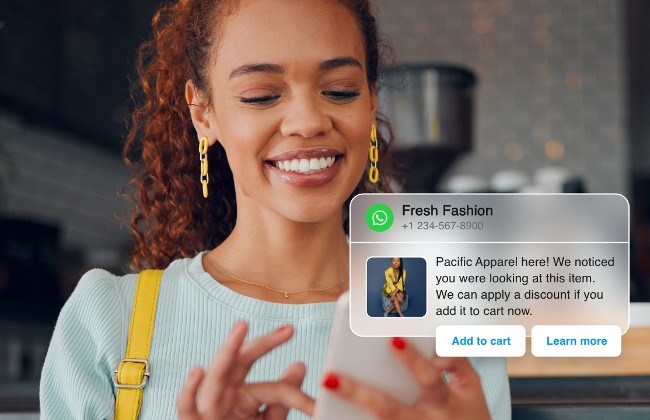The Value of Personalized Product Recommendations in Ecommerce
By Megan Warhurst
11/24/2023

The value of using personalized product recommendations in digital commerce to complete the customer experience cannot be understated.
56% of customers are more likely to return to an ecommerce site that offers product recommendations, while 74% of customers feel frustrated when website content is not personalized.
To fully grasp the importance of personalized, accurate, and relevant recommendations, let’s first look at the principles that they borrow from real-life interactions between sales representatives and customers.
- Personalized product recommendations are when an ecommerce site shows a selection of products that are unique to the individual visitor. These recommendations are made based on that visitor’s behavior and profile.
- An ecommerce product recommendation engine filters and sorts your online store’s product offers on the basis of a set of rules. This process uses data about your products, such as the number of views, sales, or even reviews, to present the most popular products in different ways.
- AI-powered product recommendations leverage the power of AI, machine learning, and incredible amounts of data to display personalized product recommendations that help support customer acquisition and customer retention.
What Are Product Recommendations in Ecommerce?
Brick-and-mortar stores have a clear advantage when it comes to establishing a bond between the customer and the brand. A salesperson can learn about the customer’s interests, intents, and needs through live conversation. They can make a real connection with a consumer and then make recommendations from that interaction.
Ecommerce product recommendation engines provide your business with the opportunity to have these types of interactions with your customers throughout their online shopping journey.
Using the digital touchpoints your audience has with your brand — like your ecommerce store, your site homepage, or an e-mail campaign — you can provide relevant suggestions for products and inspire customers to make additional purchases.
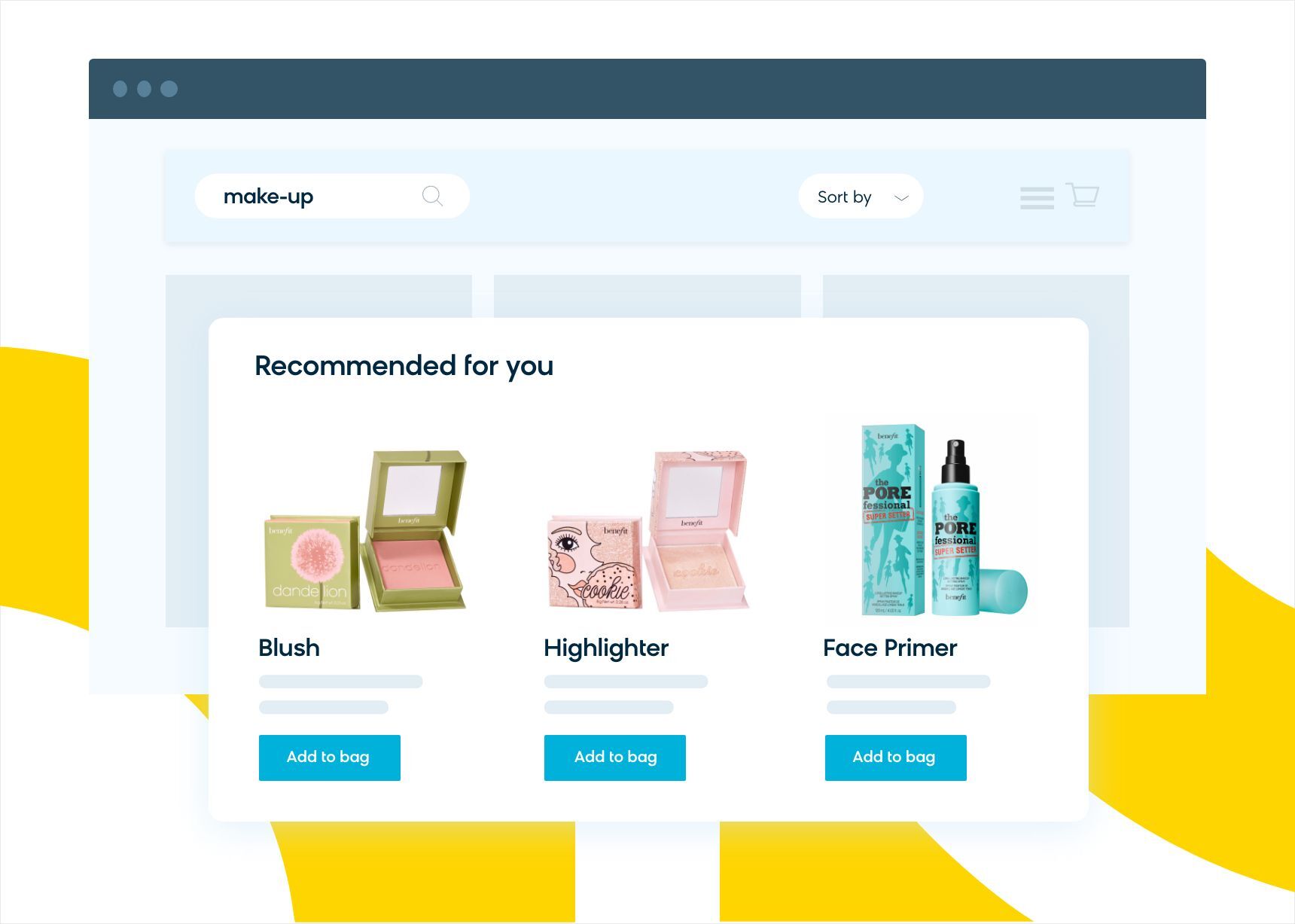
So, let’s dive into exactly how a product recommendation engine works.
We'll cover the main benefits of recommendations, where product recommendations can be leveraged across the customer journey, and why they are the key to winning with ecommerce personalization.
What Are Ecommerce Product Recommendation Engines?
An ecommerce product recommendation engine filters and sorts your online store’s product offers on the basis of a set of rules. This process uses data about your products, such as the number of views, sales, or even reviews, to present the most popular products in different ways.
The presentation of these results can be as simple as the order of products that appear on your homepage or category pages (think of the different ones you see when you shop, like "frequently purchased," "best selling products," and "past purchases"). You can use them to influence buyers at every stage of the customer journey.
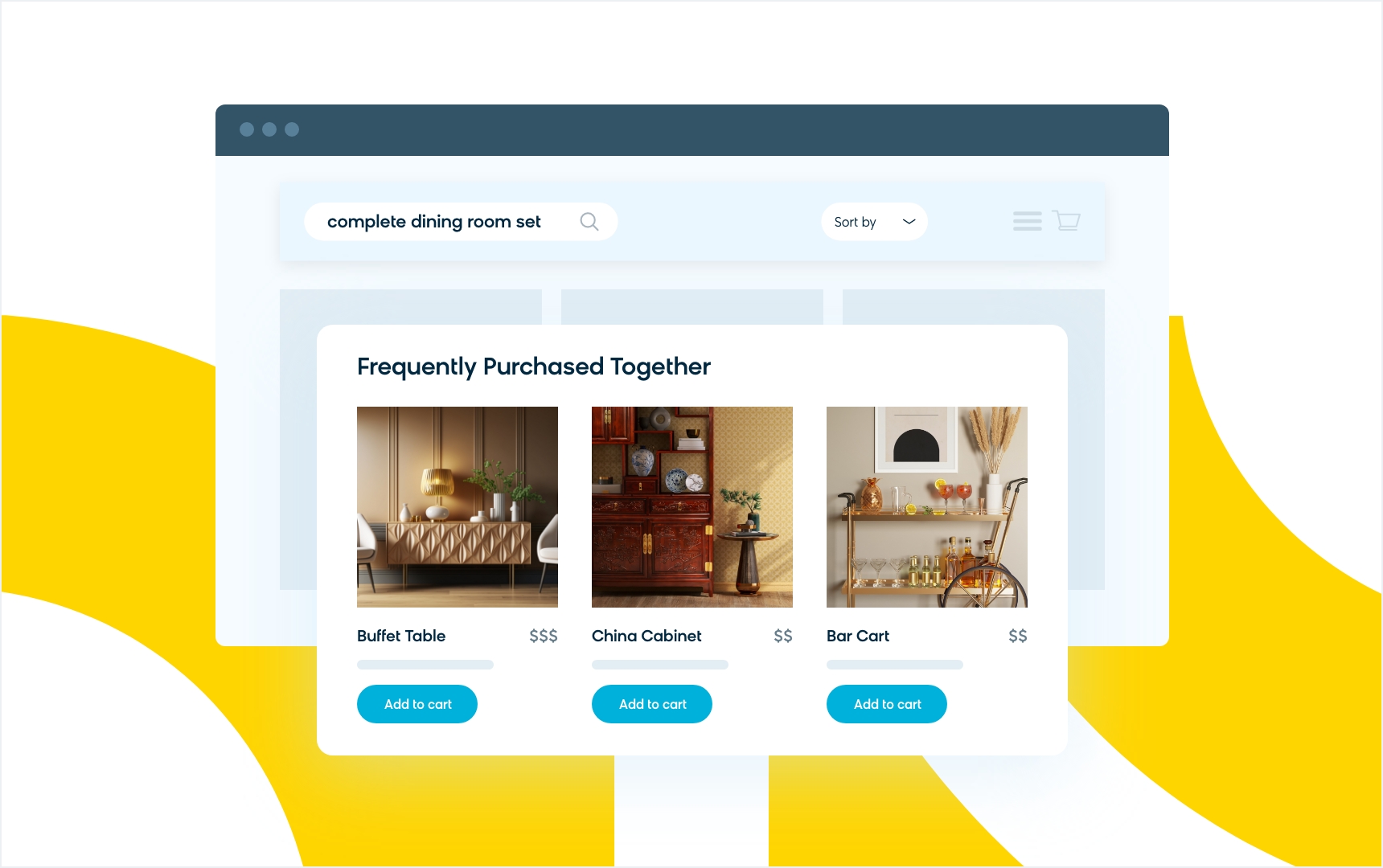
User-specific data — such as the customer’s most-viewed categories, products, and purchase history — allows an ecommerce recommendation engine to find the most relevant recommendations for your customers. The AI behind these engines, like natural language processing and machine learning algorithms, are capable of fueling countless aspects of your customer experience, including:
- Your homepage, product pages, or cart pages
- Category pages
- Personalized social or display advertisements
- Email marketing campaigns
- Special offers within search results
The Benefits of Product Recommendations
Offering relevant products is a win-win scenario for both customers and ecommerce retailers. Here are the main benefits you'll see when your business utilizes an ecommerce product recommendation engine:
- A better user experience. Helping customers find the products they are looking for should be a top priority for all online stores, and product recommendations help personalize the buying experience to make navigating your products easier.
- More customer engagement. Customer relationships are built on trust. Your audience wants to feel like your business understands them, and recommending the right products will help cultivate brand loyalty, inspire more site visits, and lead to increased customer satisfaction.
- Increased revenue. The more worthwhile opportunities you offer your customers to browse and purchase products, the better your sales numbers will be. Product recommendations can help strengthen your revenue per visitor (RPV) and average order value (AOV).
Personalized Product Recommendations Powered by AI
The power of AI — specifically generative AI — is revolutionizing the operations of ecommerce businesses.
AI-powered product recommendations leverage the power of AI, machine learning, and incredible amounts of data to display personalized product recommendations that help support customer acquistion and customer retention. This smart technology uses data-driven insights based on user behavior to offer tailor-made suggestions to individual customers, thereby enhancing their shopping experience and fostering customer loyalty.
Product recommendations have become a cornerstone of any successful ecommerce site, largely due to the advent of AI. These aren't just random suggestions; they are carefully curated selections that reflect the browsing history and buying habits of returning customers. By analyzing this wealth of data, AI can predict what a customer might want to purchase next, even before they know it themselves.
The beauty of personalized product recommendations lies in their ability to mimic the skill of a savvy salesperson who knows their customer's taste and preferences inside out. They don't just offer trending products, they show customers the products that they need specifically and encourage customers to stay brand loyal.
AI also takes into account the buying behavior of other customers with similar profiles or preferences. This broader perspective allows the system to identify trends and patterns that might otherwise go unnoticed, providing an even more customized and relevant recommendation list for each customer.
In an increasingly competitive ecommerce landscape, meeting customer expectations is paramount. AI-powered product recommendations play an instrumental role in this regard. They provide customers with a personalized shopping experience that aligns with their specific needs and preferences, thereby raising the bar for customer satisfaction.
How To Use Ecommerce Product Recommendations To Gain New Customers
When it comes to recommending products to new customers, it's all about your best-performing items.
You're trying to lay the groundwork for a long-lasting relationship with new customers, and don't have the benefit of past interactions or previous data. You need to suggest products that appeal to the widest audience and have the strongest social proof to build trust with online shoppers.
Top Seller Recommendations
Customers crave shopping experiences that let them encounter relevant products without needing to search high and low to find them. Personalized, AI-powered recommendations achieve this by continuously identifying best-selling items and curating them for shoppers new to your brand.

With the right AI and automation, you can offer your audience the best your brand has to offer and bring them closer to conversion.
The theory that fuels this commerce strategy is Pareto’s 80/20 rule of marketing. This rule alleges that 20% of your products are most likely driving 80% of your sales, and so these top 20% of your products will most likely speak to (and drive brand affinity for) new customers.
A/B testing various recommendation models — each using a different combination and weight of input parameters, such as the number of views, purchases, time spent on a page, clicks, add-to-cart events, and so on — will help you identify which model will drive sales most effectively.
Then, you can leverage these recommendation blocks across landing pages with a powerful headless CMS (content management system) like Bloomreach Content.
Rating-Based Recommendations
Nothing your marketing team could write will ever be as convincing as a 5-star review from your customers.
Humans are social creatures, and when customers share their experiences with previous purchases, they can play a huge role in the buying journey. That’s why peer-generated recommendations are some of the best ways to convince your new customers of your positive brand reputation, solid customer experience, and product quality.
Using your highest customer reviews as a basis for product recommendations will make the product come alive in the mind of your customer and also answer key questions or concerns they might have about the product.

Researchers at Boston University conducted a study that examined how reviews impact purchase decisions and found that reviews that give a detailed account of the product’s quality and usage contribute significantly to higher sales and lower returns.
The best part? These reviews can be used across the commerce experience to help nudge customers toward conversion. Just a few examples include:
- Adding positive reviews in abandoned cart email campaigns
- Attaching star ratings and review highlights in “You Might Also Love” sections of product pages
- Giving precedence to highly rated items (that also fit the customers’ needs) in search results
Cross-Sell Recommendations
Cross-selling is the practice of selling additional items that are complementary to a customer’s purchase objectives.
This practice is as crucial as it is simple. It mimics the common offline experience one would get from a salesperson through recommendation engines.
For example, retailers might cross-sell by grouping particular product categories together, such as socks and shoes or hats and coats.

Cross-sell banners leverage this sales opportunity by presenting relevant items during a customer’s shopping journey that are based on the contents of their cart page, brand interests, or last-seen items.
The most successful cross-sell recommendation models make use of collaborative filtering. This method makes predictions about the customer’s interests by analyzing their preferences and finding patterns that are similar to those of the targeted customer.
How To Use Ecommerce Recommendations To Keep Customers Coming Back for More
To entice shoppers to become repeat customers, you need to prove to them that your brand doesn't just see them as a one-time sale. You need to show them that you understand why they gave you their business and what they might enjoy next.
Utilizing the behavioral data gained from their previous visits to your business’ website and offering product suggestions that cater to their needs is the next step in their customer experience.
Remarketing Recommendations and Relevant Search Results
Today’s budget-conscious and shopping-savvy customers know to look at multiple sites. They consider plenty of options before making a purchase decision.
Remarketing is a technique for presenting advertisements and displaying your offers and recommendations. It’s a great way to meet those customers where it counts.
This method motivates shoppers to change their habits and consider your online store offers.
The type of recommendation you employ in remarketing depends entirely on the product category. High-value products, such as electronics, benefit from display advertisements that motivate customers to spend more of their consideration process on your website. These advertisements may present products that reflect an awareness of their search intent and make it possible to make comparisons within a product range.
Other categories, such as food and groceries, would benefit from a different recommendation approach. Shoppers are more likely to use their shopping cart as a collection basket and check out once they’re finished with their collection process. Suitable display advertisements present a combination of cart items, product recommendations, and complementary products.
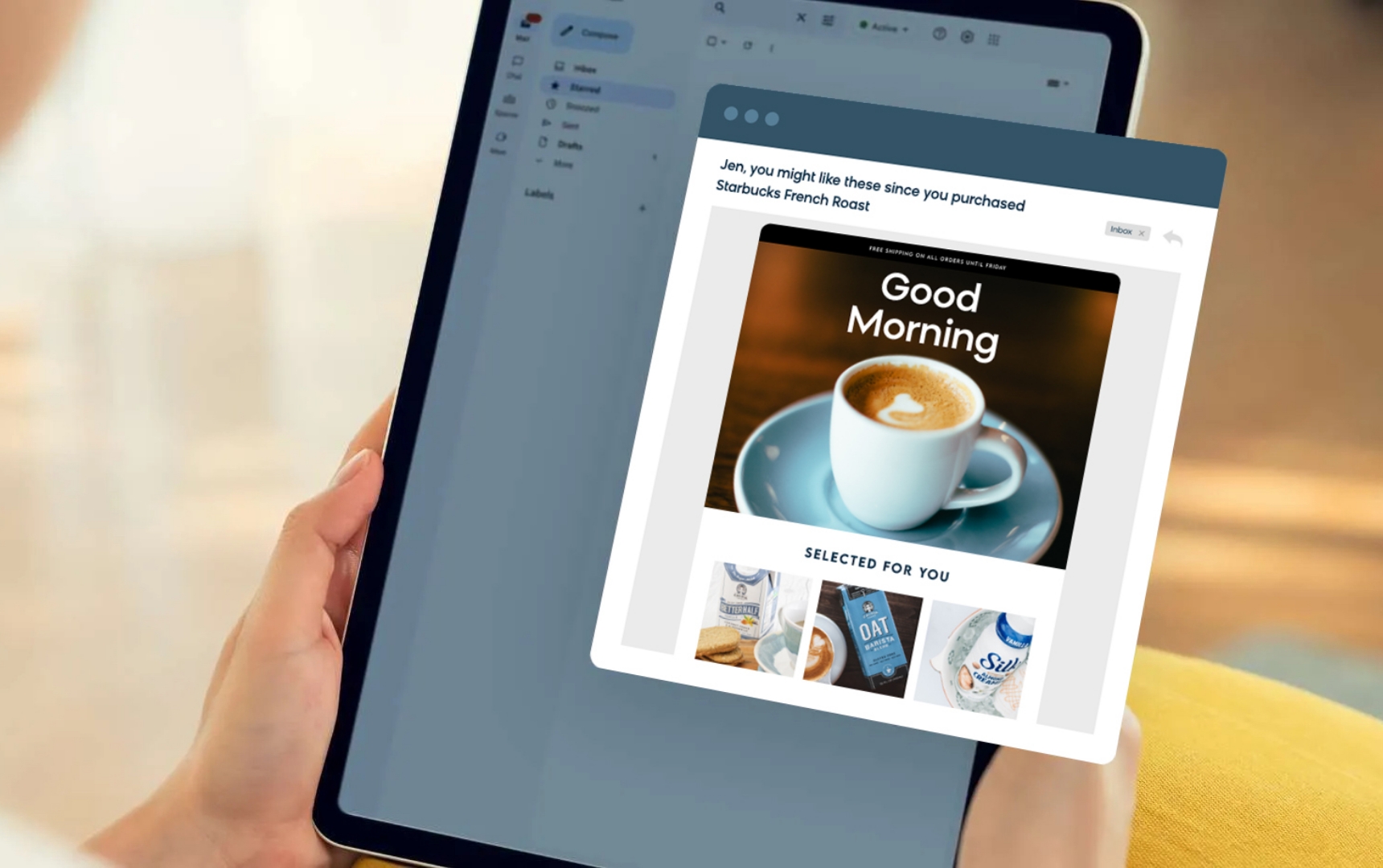
Personalized Recommendations in Email Marketing Campaigns
Personalized emails convey to your customers that they’re understood and valued, resulting in a significant increase in click-through rates.
Emails with personalized subject lines are 26% more likely to be opened. Moreover, emails with personalized recommendations improve click-through rates by 25-35%.
There are several great recommendation models that can be leveraged within emails.
Whether you want to use customer data (such as most frequented categories, purchase history, or interests) or product data (such as popularity and reviews) depends on the type of email marketing campaign.
Is your email campaign news-centered, such as the introduction of a new fashion season, the latest product releases from a brand, or a Black Friday sale? In that case, your recommendation strategy may well benefit from reviews, user stories, and the popularity of your offers. These recommendations are eye-catching and informative — and will keep your customers engaged.
On the other hand, weekly deals and seasonal offers are ideally suited for personalized recommendations. Customer behavior, such as purchase history and interests, are good sources for weekly deal recommendations, while their previous season’s activities will help you align your offers with their seasonal interests.
How To Use Cart and Checkout Recommendations
Cart pages are crucial touchpoints for your site visitors — arguably the most important.
A customer navigating to your cart is proving their purchase intent and is ready to buy your products. Adding recommendations at this stage of the process can go a long way in upselling and increasing average order values and re-engaging your customers.

Recommending Accessories
Customers often zero in on a specific purchase, like a dress or suit they may need for an event. Recommending accessories during the checkout process, such as shoes or an evening bag, will help your customers round out their purchase while also increasing your average order value.
These recommendation models require careful annotations of your product data, which means you have to answer the question: “What products are compatible?”
And let’s be real — your team might not have the time to go into that much detail. Having reviews and links to commonly bought accessories on product pages, abandoned cart emails, and more can serve as a valuable alternative to maintaining detailed records about your products.
"Frequently Bought Together" Product Recommendations
Package deals help customers purchase faster by informing them of the items they might need to complement their main purchase. It’s a successful form of cross-selling that takes place seamlessly within the checkout process.
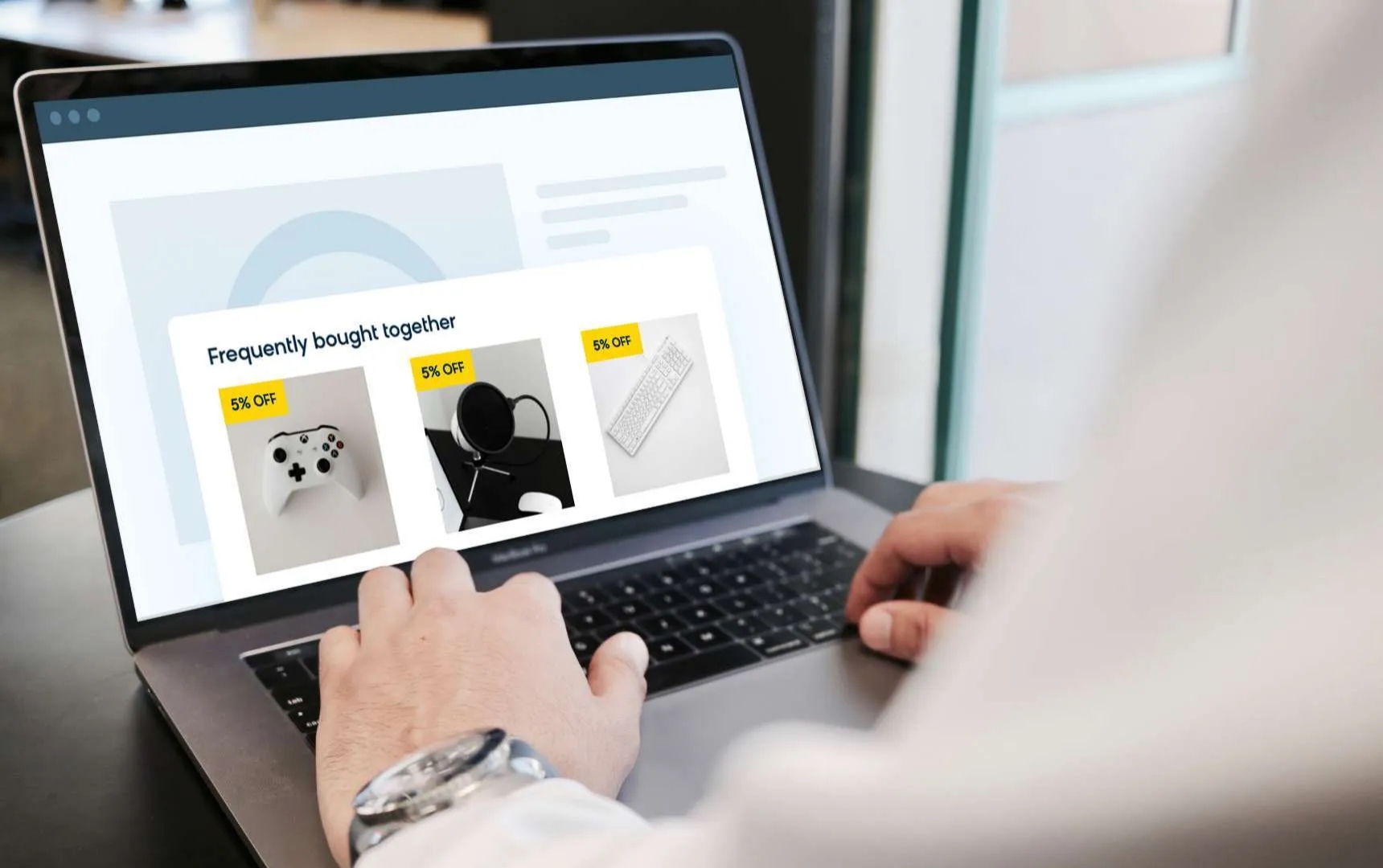
Successful recommendation models can also show alternatives to what’s currently in the customer’s shopping cart. These alternatives can be varied colors, styles, and product combinations.
Presenting reviews and user stories about the package deals will make these offers a compelling and confident option for your customer. These recommendations boost your business’s bottom line by offering alternatives that increase your AOV and motivate your customers to choose package deals that earn a higher gross margin.
Why Product Recommendations Are Essential to Ecommerce Success
Product recommendations are essential for your ecommerce site because they enhance the overall customer experience.
Personalized product recommendations not only make shopping more enjoyable, but also contribute to customer loyalty. By offering relevant and timely product suggestions, businesses can show their customers that they understand and value their unique preferences.
If you're looking to offer the most personalized product recommendations to your customers, consider adopting Bloomreach. Bloomreach powers personalized search and personalized marketing experiences for over 850 companies worldwide.
Worldwide cosmetics and beauty brand Yves Rocher used Bloomreach to increase purchase rate on personalized product recommendations 11x. Learn how your company can do the same.
Found this useful? Subscribe to our newsletter or share it.



